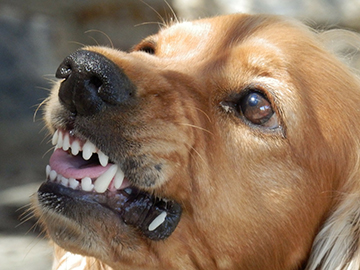Who doesn’t look forward to warmer weather – to enjoy outdoor activities and interact with friends, families and neighbours? While this is a good thing, it can also mean increased contact with pets, domestic animals like cows, horses and wildlife, which unfortunately sometimes bite. Staff in Southern Health-Santé Sud usually follow up on 300 to 400 reports of animal bites every year, most of which involve pets such as cats and dogs. Animal bites can put you at risk for rabies, an infectious and contagious disease of the central nervous system which can be fatal if not treated with the rabies vaccine.
Be Responsible Around Animals
To avoid animal bites - and the potential for rabies - pet owners should understand how their pet is likely to act around other people. Ensure pets are kept under control and make sure their rabies vaccinations are up to date. People interacting with someone else’s pet should do so cautiously and responsibly to avoid scaring or annoying the animal. Be especially cautious around young children because they’re not always gentle with pets. Animals – whether domestic or wild, – will be extra protective and dangerous when they have young nearby.
Anyone bitten by an animal should seek medical attention for care of the wound and for an assessment of the risk of exposure to rabies. If the animal is at risk for rabies, the person bitten is offered a rabies vaccination. It is important to provide as much information as possible regarding the animal exposure to health care professionals so that an accurate risk assessment can be done.
Leave Wild Animals Alone
People should always avoid feeding or coming into contact with any wild animal. “Rabies is endemic in the skunk population, so if someone is bitten by a skunk, we vaccinate immediately. Skunks also interact with pets, cows, horses, goat and sheep in rural areas, so many types of wild animals can pose a risk,” says Dr. Michael Routledge, Medical Officer of Health for Southern Health-Santé Sud. “Not a lot of animals test positive for rabies each year in our region, but there are enough to know that the potential is there, so people should be cautious and make sure they report and seek treatment for any animal bite.”


